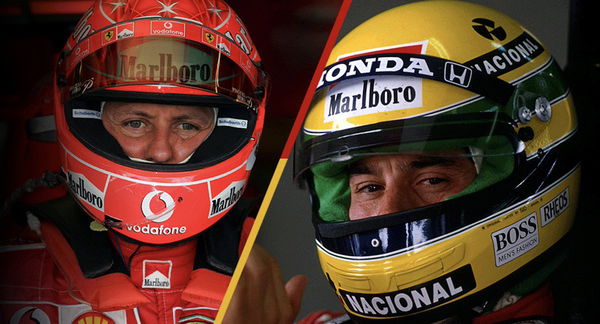
via Imago
Credits: Twitter.com

via Imago
Credits: Twitter.com
There are drivers.
There are great drivers.
And there are those who can only be described in cosmological terms.
ADVERTISEMENT
Article continues below this ad
Because calling them exceedingly talented would be saying what’s already understood. Calling them world-beaters may also not suffice.
We heard while growing up that some feelings and emotions may never be put to word.
Yet, we don’t resist the temptation to make our favorites- whether Fangio or Hamilton, Senna or Schumacher, Prost or Alonso- clash with one another in the battle for supremacy. Isn’t it? This is when truth is that making one stand on another would be a step mired in indecisiveness; for they’re all special.
But we all need that one surreal sobriquet of excellence in Formula 1. Don’t we all?
And that’s where we find an answer that while subjectiveness may prevail in the end, as it should, it’s the math that doesn’t lie. Right?
To that end, one wonders whether statistical brilliance as a yardstick for understanding a Formula 1 great would suffice? This, of course, is a really complicated DNA (to understand) for it doesn’t mind going down mortal dangers’ way in the search for exhilaration or as Hunt the ‘shunt’ had himself declared, “Don’t go to men running in circles trying to find normality in life!”
Therefore, would counting the likes of Juan Manuel Fangio, Niki Lauda, Jim Clark, Alain Prost as greats would do justice to recognize their stature in the sport?
Because it wouldn’t take you to behind the mic to know that statistical greatness alone doesn’t reveal everything about the greats. That said, let’s attempt at understanding what constitutes greatness in a sport where perhaps at a certain fan-level there may be a bloodbath if one were to hold Schumacher superior over Senna and vice-versa.
A question, therefore, to all of us, something worth assessing.
What was the thing about Fangio- 24 race wins to Lewis Hamilton’s 76- that still makes him a great? What was about Alain Prost’s 106 podiums that though stand 26 more than Ayrton Senna but (may certainly) never come to enjoy the panache the Brazilian essayed?

Also, if El Maestro’s (Fangio) 5 world championships albeit 35 podiums stand much below Lewis’ staggering multiple-world titles, then what is one to do with aspects that made Fangio what he was?
Additionally, should we discard qualities such as risk-taking, boundless courage, and race-control if the statistical output of a driver doesn’t make him displace another, regardless of him being from another era? Also, it must be asked, would Lewis have reached the place where he stands now had it not been for his nearly faultless driving and race-craft?
Perhaps, we must thank Formula 1 for giving us a chance to participate in the cavernous puzzle that it is for few sports allow legends from different eras to stand united on the podium all thanks to it aligning achievements and skill.

via Imago
Credits: Racer.com
But even then, the question concerning F1 greatness goes somehow unanswered. So should we place the 2018 World Champion Lewis Hamilton, on the cusp of a sixth world title (unless his teammate were to blow the Briton’s plans) over Fangio, a man who drove in the sport’s maiden season, someone who took Argentina to the globe way before Lionel Messi was even born?
Should we also warrant four-time world champion (and former youngest-ever F1 winner, Italy 2008, before Max broke the record) Vettel a place over Niki Lauda, purely on race wins, reserving less for a man who fashioned modern sport’s greatest-ever comeback?
Maybe, the discussion about who’s the ‘Boss’ rests ever so coyly on circumstances too. Does it not?
Fangio broke his neck and would return to motor-racing having sat out for a year and a half.
Did he not?
Ayrton Senna evokes goosebumps to this day (and may always) despite having been snatched away back in 1994, thanks to the wretched events at Imola.
And one can’t tell the difference whether what’s more goosebump-ish is it, the emotion he trickled in his maiden win at Brazil or in that exhibition of doggedness at Donnington Park under rains?
Yet, it must be said, Prost endured the Senna-challenge and beat him with glee on occasions using clinical precision. And maybe that is why they say that “greats”- wherever, whosoever they may be- glitter in the gloom. Picture the duo’s rivalry in the late eighties and early nineties.

via Imago
Credits: Fineartamerica
Also, picture Senna- a triple world champion to Michael Schumacher’s seven titles- driving around in Monaco- taking race-control to another level in the same instance as his pace schooled others on the grid at a track where overtaking is about as easy as solving Rubik’s cube blindfolded.
And all that said, must we not forget Michael Schumacher who did things to the sport that were absolutely unprecedented, well before the troika of Hamilton, Vettel, and Alonso even arrived.
What about “Schumi’s” greatness?
Will the stature of the “Red Baron” of Formula 1, a man with 91 wins and 7 world titles find itself challenged – for life- if Hammertime prevailed in 2020 or whenever it does?
And maybe Jean Alesi, the former Ferrari driver adds an interesting take to what is an enduring discussion when he says that Ayrton Senna, part-human, part-legend, purely-magical- was quickest even vis-a-visa Michael Schumacher.
This, it must not be forgotten is Alesi’s take about a driver responsible for setting the most number of laps ever achieved in Formula 1, at 77.
So before the mind breaks you into a pause for a few minutes, where would you put against F1’s league of extraordinary gentlemen these two drivers who were, for the lack of a better word, warlords since the world’s most expensive motor-sport is at the end of the day, a battle between life and death?
Schumacher was only a novice and but incredibly quick, not to forget, a man who raced alongside Ayrton Senna when the latter was already a don of F1 racing. But would you take the two out of the equation if a Leclerc or Verstappen happened to outscore their tally?

The classic Senna vs Schumacher debate has raged for the longest time.
It’s become a subject for popular social media opinion instead of it being a great leveler of sorts since both drivers under peak rains- whether Schumacher at Spa in 1992 or Senna at Donnington Park.
ADVERTISEMENT
Article continues below this ad
It’s an exhibition of these drivers’ greatness that gave the sport endlessly even as they came much later than the likes of Jim Clark, Giles Villeneuve, Jack Brabham, Graham Hill, James Hunt, to quote just a few.
To that end, perhaps it makes sense to feel that Jean Alesi (someone who’s driven opposite both Michael Schumacher and Ayrton Senna) has helped us by remembering that philosophically, the sun or the moon may never outpace each other even as one among them shines brighter at some point in the day.
And therefore, what should win in this endlessly intriguing debate is that Formula 1 is the ultimate winner since it’s the universe in which both Senna and Schumacher loomed big.
ADVERTISEMENT
Article continues below this ad
Jean Alesi was quoted as saying, “Some drivers when they talk to engineers, they work for that and others not. “Michael was the typical driver where, whatever he was saying, the team was following his words. “And that made him a huge champion, because of trust he gave to the team and the team worked with him and he was a very hard worker.”
“But with Senna… I don’t know how to say, but Senna impressed me more. Speed-wise.”
ADVERTISEMENT
ADVERTISEMENT
ADVERTISEMENT
ADVERTISEMENT

